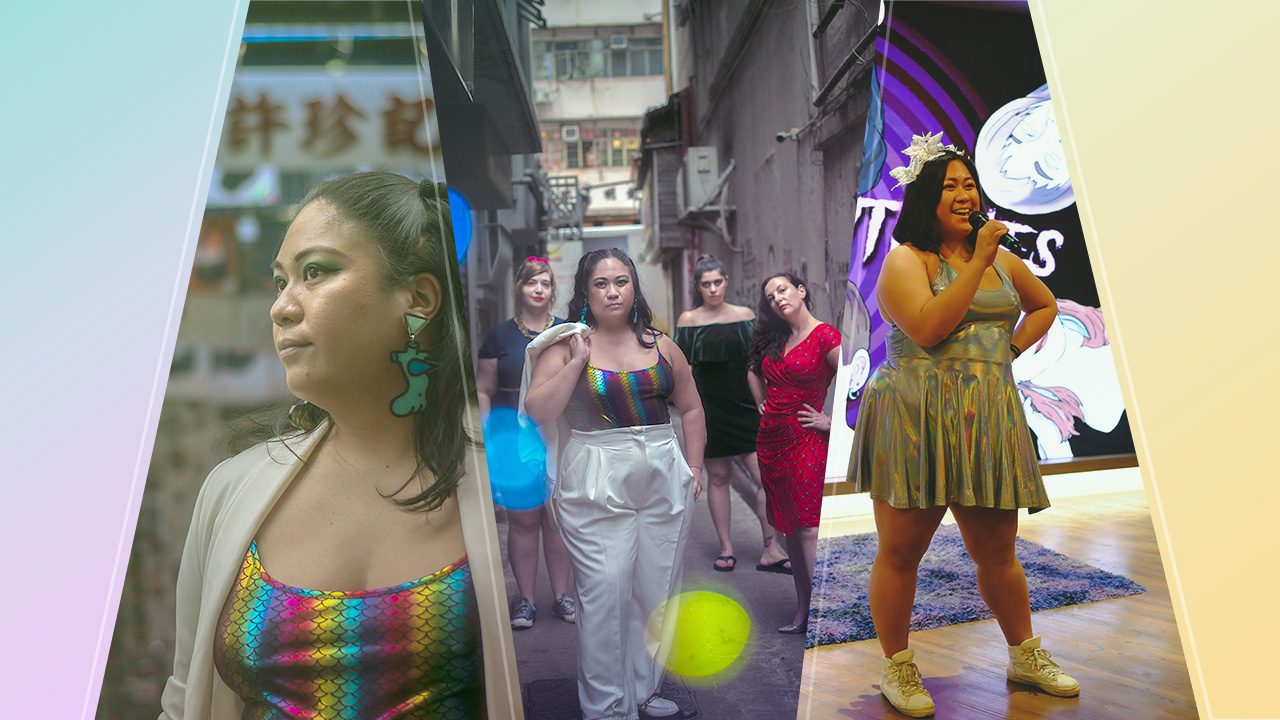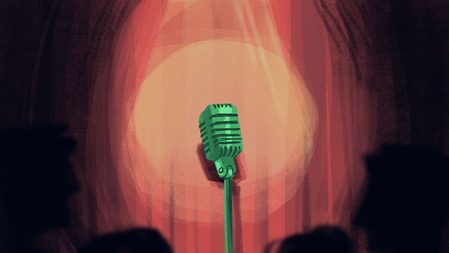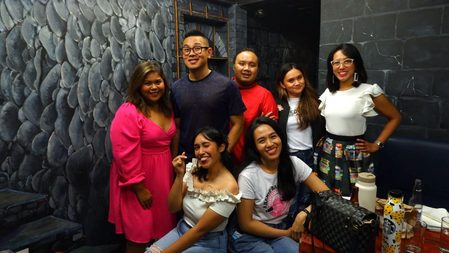SUMMARY
This is AI generated summarization, which may have errors. For context, always refer to the full article.

MANILA, Philippines – Copywriter and branding expert Francesca Ayala has a boisterous, no-holds-barred laugh – the kind that completely takes over a room. You can tell the 39-year-old loves a good joke, which is why you can often find her at Comedy Manila’s open mic nights across the metro each week. But she isn’t just cheering on local comics offstage; she also takes the mic herself, and channels her energy into raunchy, very physical bits.
Born in the US and raised in the Philippines, Ayala is one of the women behind Bitches in Stitches, Hong Kong’s first all-femme comedian group which, since 2021, has been offering a space for all kinds of women to show off their humor in a male-dominated industry.
Ayala is now currently based in the Philippines, and Rappler sat down with her to learn more about her thrust to champion women in comedy.
(The following interview has been edited for clarity and brevity.)
First off, tell us a bit about your roots – where you were born, and where you’ve lived since.
I was actually born in San Mateo, California in 1983, but I only lived there until I was three. My parents and I moved back to the Philippines after the People Power Revolution in ‘86. I grew up in Manila. I was here until I was 17 years old, and then I went to college in Lugano, which is the Italian part of southern Switzerland. I was there for five years, and then I lived in LA to get my master’s degree at USC, University of Southern California, in journalism.
When and why did you move to Hong Kong?
I wanted to move to a place where I could put my degree to use, an English-speaking country, and I saw that there were a lot of opportunities in Hong Kong. So in 2011, I actually left an abusive relationship, which at the time I hadn’t processed, but I left in the middle of the night with one suitcase, left the keys inside my LA apartment. I got on a plane, and I landed in Hong Kong with a dream and a suitcase, and I was there for 13 years.
How did the whole stand-up thing in Hong Kong come to fruition?
Stand-up comedy came to me after a breakup. So I ended a seven-year relationship, and I hadn’t been single for a very long time. And the last time I had been single, there weren’t any apps. And my friends were seeing me a little bit miserable, and they’re like, why are you wallowing? Get on some dating apps. And as people know by now, you tend to come back with a couple of stories, some great dates, a lot of bad dates. And some that are actually just comical. And when I would tell them about these dates that I was going on, they would say, girl, A, people should pay you for these stories. And B, we really would like you to get another hobby.
So I started going to open mics. I did open mic for maybe a year, a year and a half. This was 2018 when I started doing stand-up. So I had been in Hong Kong for seven years. And then by 2019, I got my first paid gig at a queer comedy show, because I identify as bisexual. And from there, that’s how I got into comedy.
What was it like trying to start out in stand-up in Hong Kong?
There’s at least two English open mics a week in Hong Kong. They’re normally organized by people affiliated with Comedy Hong Kong. But there are other open mics as well. And I went to support a lot of shows from the different outlets there as well.
The first paid gig that I got booked for was by Pink Alliance, the non-profit. It’s a queer LGBTQ+ non-profit. And they booked me through, I guess, other queer comedians who had known me in the scene for my first gig.
How was the Filipino contingent of the Hong Kong stand-up scene?
I actually really love it. In Hong Kong, it’s separate – there are Cantonese open mics and the English open mics. So the Filipino contingent is part of the latter. In that contingent, there’s me, and then there’s a lot of mixed-race Filipinos. So they can be Filipino-Chinese, Filipino-Caucasian-American, Filipino-Indian.
Is there a running thread among all the Filipino or half-Filipino comedians? Something that binds them together?
There’s a lot to say, I think, about identity, our identity as Filipinos. I think that tends to be a common thread in Hong Kong in general. Because it’s such a melting pot. It’s like a very high concentration of different nationalities with no personal space. So you have no choice but to interact with one another. And I think identity is very strong in a lot of comedians, but especially for Filipino comedians. Because we have such a big OFW, expat population over there, so you can’t help but include it.
And I think a lot of my comedy stems from my identity as a Filipino, but also just how Filipinos are perceived going abroad, whether it’s to work, or to visit, or to live. And just, like, the cultural differences. There’s my identity as a Filipino in Hong Kong. And then being mistaken for a helper or a working girl. So there’s definitely a lot of microaggressions that I talk about – and that I think a lot of comedians in Hong Kong in general will talk about. Because people are going to have opinions when there’s so many different nationalities interacting with one another.
Could you tell me more about the trajectory of your stand-up career and the challenges you’ve faced?
So after my first paid gig, I was booked a lot by Comedy Hong Kong. But I noticed that there was a bit of a disparity in terms of female representation. I will say maybe there were about 10 of us or fewer who were getting booked regularly on paid gigs. And it was because there just weren’t that many women doing stand-up – because there weren’t many who were in the scene.
I would be one woman out of a lineup of six, and everyone else would be a cishet guy. So my comedy didn’t necessarily resonate with those types of audiences. And the producers or the bookers were all men. So it’s kind of also hard for them to prioritize from a small selection, and because I don’t think diversity and inclusion is necessarily at the top of their minds. I’m not saying they don’t believe in it. But I’m saying you have that unconscious bias or that privilege of just like, oh there’s so many comedians. You’re not in the shoes of someone who’s been othered.
So that’s what led to your building your own comedy group?
So in 2021, I noticed that there had been a lot of conversations about needing more women doing stand-up comedy. I think I wanted to put together that sort of environment and create a space where queer people, femme comics, non-binary comedians could come up onstage and just not feel insecure and not feel worried that they wouldn’t be relatable.
So I said, instead of having these conversations with men, I said, why don’t we start our own show? So I got together with a fellow femme comic who had been doing stand-up longer than I have and we produced a show called “Bitches in Stitches.” We sold out 30 tickets in six hours. And it went really well. It was a great debut, and the bar asked us to make it a regular thing. They said, look, there’s clearly a market for this. So we got a monthly residency at that bar. We also sold our second show out in less than 24 hours.
There really is an appetite for female-centric comedy – or just non-cishet male-focused comedy. There were six of us who were on that first show, but all of a sudden there were more women coming to open mic. There were more women not just watching. They were getting up onstage and they were telling jokes.
We also did workshops. We did stand-up comedy workshops where it was focused on delivery or focused on writing. We would give each other feedback just in my house. So what started out as a six-woman lineup on one show became a full-fledged comedy troupe, a business that I ran for two years. And by the time I left Hong Kong, there were around 15 members who were rotating in and out of our lineups.
So you moved back to the Philippines just this year, and you’re already doing open mics through Comedy Manila. What is your impression of the local comic scene?
I love it. It’s just so diverse in terms of, not just the fact that they’re bilingual, but in terms of the types of humor that they present, in terms of just the types of comedians. There are so many different styles that I see incorporated. There’s so many different ways of delivery styles, writing styles, and I’m really loving it.
And there are more open mics going on compared to Hong Kong. Over here, there’s at least five that I know of; like every day of the week, you could go to an open mic and catch a show. And I love that.
What are your takeaways from the female comic scene here locally, so far?
The female comics here are hilarious. I haven’t seen all of them live, but I’ve seen a few of them live, and I think it is up to par in terms of diversity with Hong Kong. You have the Lady Boses, who are under Comedy Manila. You know, they’ve got their own podcast. We never had that at Bitches in Stitches. And they have a very, very strong following, so I’m very, very into it.
In fact, I have plans to work with them. We’ve just last night actually talked about doing a crossover between Bitches in Stitches, where they’ll come here and do something with the Lady Boses where it’s like a half-and-half lineup.
I would describe Filipina comic humor as revelatory. And I would also say trailblazing. I think Lady Boses is a good example just in terms of nomenclature, because they do speak their minds about things that aren’t normally talked about. So it’s not only topics that we don’t normally discuss in the Philippines like sexuality, like calling out body shaming, or like microaggressions. It’s the fact that they’re also women. It’s the women who are saying, let’s talk about these things. Let’s have a conversation and let’s laugh at it because it doesn’t always have to be so serious. Sometimes this can be fun and awkward and show a new perspective to an audience. And I love that.
Besides doing open mics, what else are you busying yourself with here?
I’ve partnered with Trivia Down Tuesdays. We do a sex education quiz once a month at Heckle and Jeckle Makati. It’s a really fun night. So I host and I come up with the content. It’s meant to be something that opens a discussion about reproductive health, about just destigmatizing publicly talking about sex. Because it’s important, I think, that in order to have great sex you need to know about safe sex. So I’m planning to do more of that. Our next one is on September 8th.
What’s your advice for someone who wants to get into stand-up comedy?
Just do it. Because there’s never a good time to get up onstage, because you have a different audience every single night. So you’re never going to be prepared for getting up there. So just do it and see how it feels.
My second advice would be, if you’re feeling nervous – because it is very unnerving to get up onstage and tell jokes that might be intimate or very personal to a bunch of strangers – just remember that nobody knows what you’re going to say next. So if you forget something or if a joke didn’t go the way you wanted it to, nobody knew how you were going to do it. Just be yourself and have fun with it and see what that opens up for you. – Rappler.com
Add a comment
How does this make you feel?


There are no comments yet. Add your comment to start the conversation.